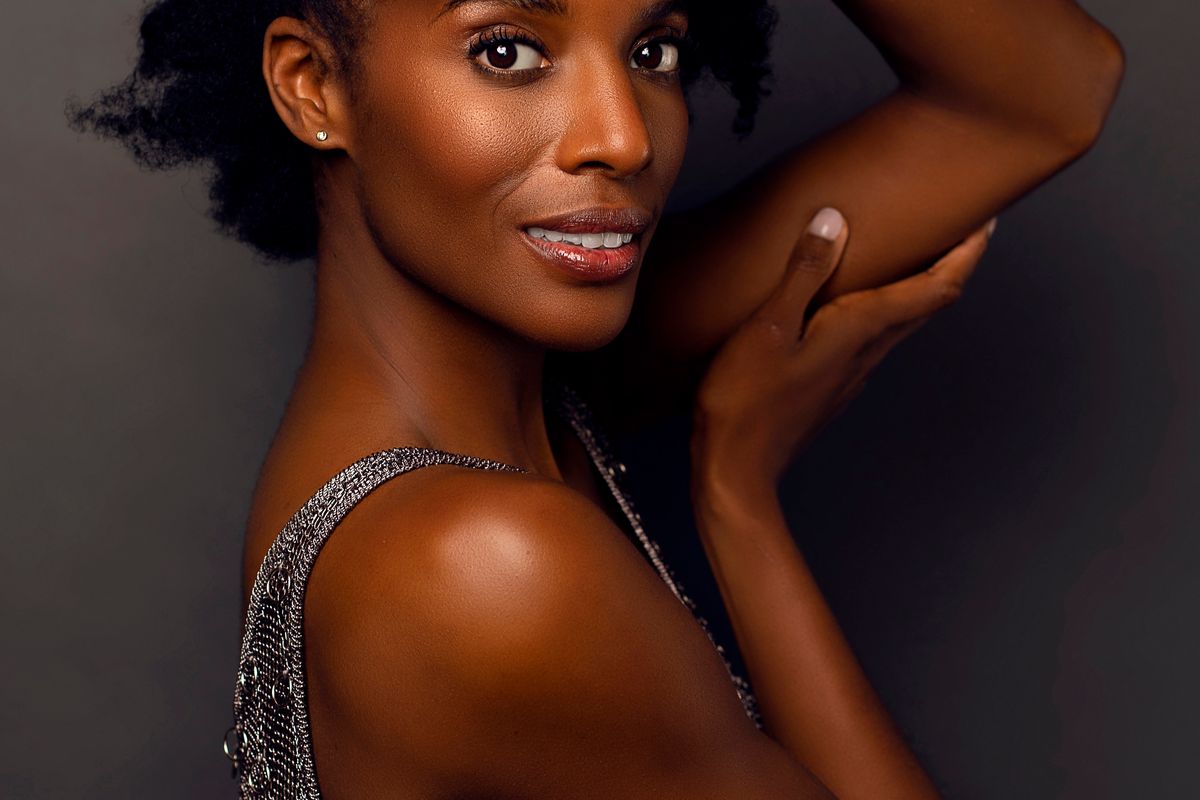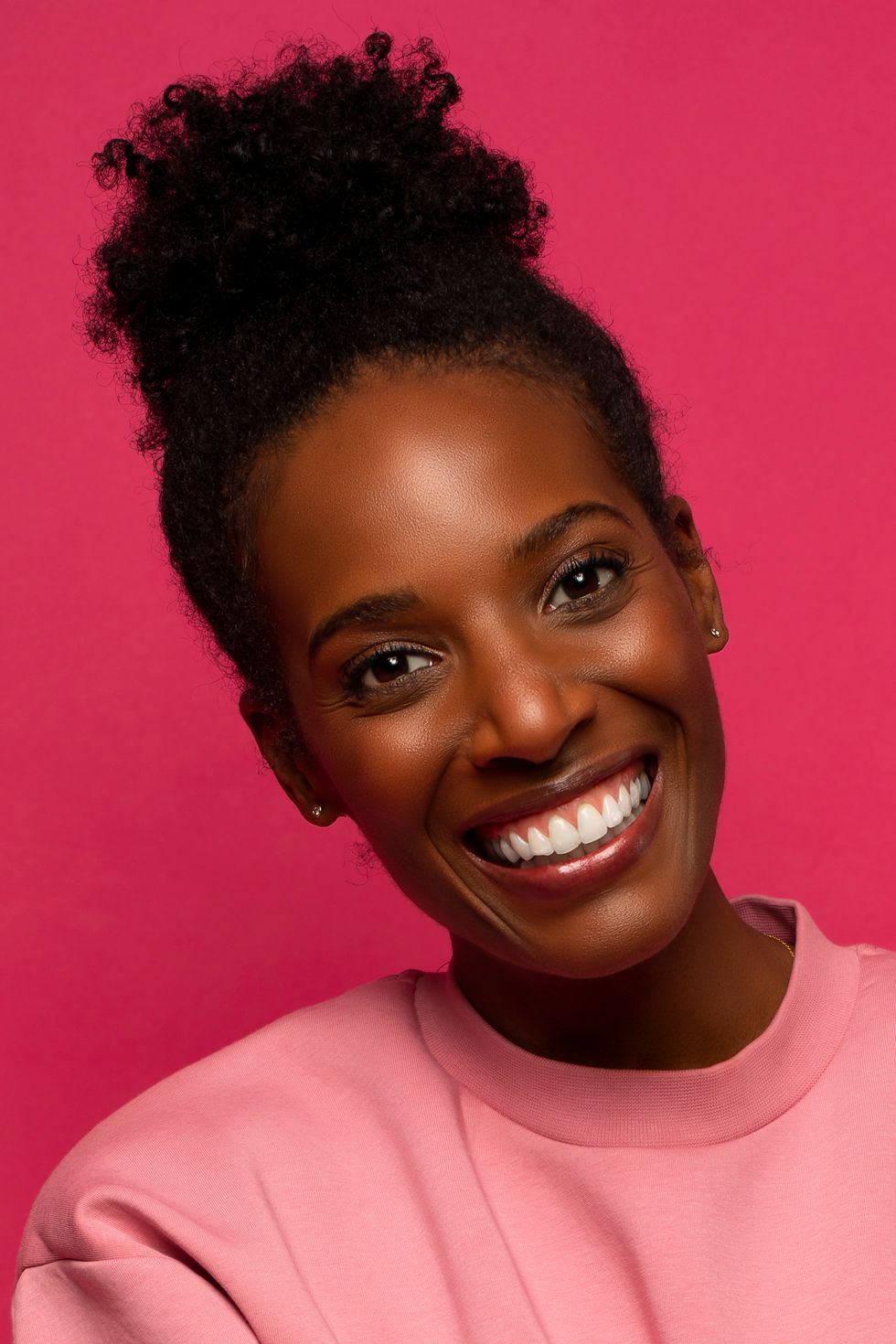Zainab Johnson is Creating Unapologetic Comedy
The standup comedian, actor and podcast host talks about growing up a Black, Muslim woman in New York and what it's like fasting for Ramadan in a COVID-19 world.

"Give it up for my Afro," yells Zainab Johnson, as she takes the stage of the Seth Meyers show before launching into a set about racist friends, dating as a Muslim, and growing up in a massive family— difficult topics handled in an off-kilter, candid style.
I first encountered Johnson via YouTube algorithm recommendation. The ease with which she combined thought-provoking social commentary, with light hearted playfulness was impressive and I was instantly a fan. I had soon watched all her videos. What moved me most was how she chose to speak honestly, openly and unapologetically about who she is as a Black Muslim women.
Born and raised in Harlem, New York, Johnson grew up in a devout Muslim family with her parents and 13 siblings. Her large family, she says, gave her a built in community and she didn't feel the need to put much stock in relationships outside the home.
"There were times when I needed my space to think and breathe and I didn't have that," Johnson says about the experience. "It's like the best thing and the worst." It's these early experiences with her family that she credits with fueling her creative content.
She studied math, becoming part of the first generation in her family to graduate university. Her goal was to become a teacher because, as she puts it she didn't know any better. "On T.V. it seems like teachers are doing OK," says Johnson. "But once you get into the world of teaching you realise, oh no! This is like slavery."
At college, Johnson made a close friend who talked her into moving to L.A to be famous together. "Every friend of a celebrity that we know, they're also a celebrity, so I thought 'oh ok, I have to be famous too!' (laughs)." Sadly, it was around this time her father passed away, an event which motivated her to move quickly and without regrets. She hopped in her car and drove across the country and as she puts it "just sort of figured it out."
Last year, Johnson was named one of Variety's Top 10 Comics To Watch. She currently co-hosts the Netflix show "100 Humans" and is a series regular on "Upload", an Amazon Prime original series by Greg Daniels (co -creator of Parks and Recreation). Aside from her work in standup and acting, she writes and hosts her own Podcast, Honest Tea with Z.
I caught up with Zainab via Zoom—her peering into the screen from Los Angeles, and I from Fiji. Among other things, we spoke about her career in entertainment and fasting in Ramadan during the era of COVID-19. We also compared our experiences growing up Muslim in New York and South Africa.
Zainab Johnson Stand-Up Performancewww.youtube.com
This interview has been edited for length and clarity.
Your work as a standup comedian and podcast host draws heavily on your experiences as an African American Muslim woman. How have you been received by audiences both in the US and abroad?
My approach to comedy is not by telling you your life but by sharing my life with you and hopefully you identify in some way or you learn something. Hopefully the entire experience is as humorous as possible.
I like being on stage in places like Minnesota where there is a large population of Muslims—East African Muslims where the community is not participating in the arts in the same way. A woman getting on stage and unapologetically giving her perspective, talking about dating as a Muslim, navigating a world that is very much entrenched in sexuality but not preaching, navigating this space not just as a Muslim but as a black woman and feeling like an outsider because some women may not give me the greetings because I don't cover up.
Every part of the US has a level of segregation. We just do a better job of covering it up in certain cities and regions like LA, New York and Chicago but in middle America there's no cover up, it feels very divided. So, I go into those cities and states unapologetically myself.
In your podcast, you're not shy of sharing your thoughts on copious topics including, dating, blackfishing, politics, fear, self-care, popular culture and your experiences fasting during Ramadan. What have been some advantages and disadvantages of being vulnerable with your audience?
The advantages of my podcast are that I get to connect with people, especially now during COVID-19 when people can't come to my shows. So, I still get to be in their ear and be in their homes at least once a week and give them my perspective and sometimes, it's not funny at all.
A term I often use on my podcast is "I'm talking to you guys, but I'm talking to the woman in the mirror". The idea is that this might be a lesson to you but it's really a lesson to me. So, at the end of this experience, I'm hoping that we both grow. If everyone who hears this is growing in some way that I'm doing my part to help the world be a better place.
The disadvantage—which is also ironically an advantage—is that I always want people to feel like they're just chatting with a friend. And because of that, people actually reach out to me expecting my attention as if they were my friend. I'm very honest on the podcast and in real life, so I do give people perspective. I try to be clear about the boundaries.
It's currently the Muslim holy month of Ramadan. What were your childhood experiences during this month of fasting? Did your family's customs differ from your peers who were non-African American Muslims?
I had very few Muslim friends growing up. All the Muslims I knew were from the masjid I went to growing up. I do remember enjoying Ramadan as a little kid, waking up early with my parents really thinking I would fast and then by 10 o'clock being like "I'm hungry". I remember us going to the masjid in the evening to fellowship, eat and pray. I also remember feeling that I had something that all of my non-Muslim cousins and classmates got to do around their holidays that I never got to partake in. So, Ramadan was almost like a holiday for me, especially when Eid came around, I thought "yea! I get a gift". I know that sounds shallow but, as a kid, that means a lot.
Then as a teenager, I didn't fast at all for Ramadan. In high school I was trying to be the cool, popular kid and I wanted nothing to do with being Muslim. I was Muslim in my heart and mind but what I gave out to the public was that I didn't want anything that made me seem different to any other popular girl at school. I think it was peer pressure, wanting to be accepted and having gone so long feeling like an outsider. When I was in elementary school there would be times when not only was I the only black kid in the classroom, I was the black kid wearing a scarf – so, I'm Black and I'm Muslim.
It's been a surreal Ramadan for millions of Muslims, myself included, this year due to the circumstances surrounding COVID-19. A month where we are accustomed to consciously spending more quality time with loved ones, serving the most vulnerable members of broader society, and partaking in extra congregational prayer. How are you adjusting to celebrating Ramadan during this period of social distancing and lockdown?
The lockdown has helped a bit because it has really opened up my time to practice and celebrate this Ramadan in a way that I haven't been able to before. I'm always working. I'm always on the go and it's one thing to not be eating or drinking while the sun is up but it's another thing to be reading the Quran, trying to learn and to be making all five prayers. Because I've had the time and space, at this point, I've been doing that. I think it's feeling very spiritually rich.
I'm celebrating it differently during other years in the way that, not seeing people, means that I'm sharing a lot of my experiences with my public. So, I'm sharing a lot of my Ramadan experiences with people who are not Muslims and don't even know what Ramadan is.
I do miss being able to go to the masjid but I'm watching services online and I'll be partaking in a virtual Eid prayer on Zoom – so, I'm looking forward to that. Just how we find ways to do business and to hook up during this time, you find ways to practise your faith.

Your voice and experiences are unlike any other represented in the narrative of mainstream American culture. Your star is steadily rising. How do you hope to impact the cultural landscape?
I just want any group that I identify as to be motivated by me and see some sort of inspiration in me. So, if that's women, Black women, Muslim women, Muslims, someone who grew up a middle child in a large family, or someone who studied one thing but hasn't used their degree at all in their life. I want people to see me and say "I see myself in her and she seems ok, so it's going to be ok".
I definitely want to open up opportunities for other people but sometimes even when an opportunity opens up and you don't believe that you are deserving of it. You won't pursue it. That is why I rely on my relationship with God so much because everything starts with me. I have to be confident, compassionate, forgiving etc., before I can expect that of other people.
Also, as much as I am Black woman, I'm a dark-skinned Black woman and all around the world there is coloursim. I want to create a sense of self that allows girls, Muslim girls and black women to know that I can create my opportunities and that I always belong there.
What can fans expect next from Zainab Johnson?
Right now, fans can see me on Upload on Amazon, we'll have season two coming out as well. I'll have new episodes on my podcast. I'm currently writing my own projects including a romantic comedy, half hour TV show and an hour comedy special. Hopefully in the near future all those projects come to fruition. Fans can keep in touch with me via social media and my website, this is where they'll find out all the great things that I'm up to. Right now, I'm just hoping to be safe and get out of COVID ok and I want the same for everyone else.
***
Follow Zainab Jonson on Instagram and Twitter
- Interview: South African Comedian Tyson Ngubeni's Skits Shine ... ›
- The Humorous Politics of South African Funerals - OkayAfrica ›
- "There wasn't a big freedom scene": Trevor Noah Talks Comedy In ... ›
- Yvonne Orji's First Comedy Special Is Headed to HBO - OkayAfrica ›
- In Conversation: Yvonne Orji on Her Groundbreaking HBO Comedy Special Momma, I Made It! - OkayAfrica ›
- Josh2funny Is the Nigerian Comedian Inspiring Global Trends - OkayAfrica ›
- South African Comedian Tyson Ngubeni Leads Star-Studded Cast in Chicken Licken's Viral Ad - OkayAfrica ›

